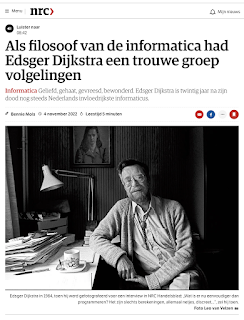This article was published on the website of the European Science-Media Hub on 9 November 2022
‘AI is about algorithms’, said a computer scientist. ‘AI is about machines that can learn from data’, said an engineer. ‘We need to do something with AI’, said a business manager. ‘AI is an existential threat for humanity’, said a sociology student.
Over the past decade, artificial intelligence has become branded as AI, but does everyone mean the same when they speak about AI? Not really. “A babylonian confusion of tongues has arisen”, says Geertrui Mieke De Ketelaere, Adjunct Professor at Vlerick Business School in Ghent, Belgium.
Geertrui Mieke De Ketelaere: I started working in the field of artificial intelligence when it was just an academic discipline, in the early 1990’s. A decade or so later, businesses started to be interested in AI, and they started to use their own language, stating things like ‘data is the new oil’. Later, some ten years ago or so, governments stepped in and started using their own language around rules, laws and ethics. And now, scientists, technologists, business managers, sociologists and lawyers are sitting around the table, talking about AI, and they don’t understand each other any longer.
So, what should be done?
Geertrui Mieke De Ketelaere: We urgently need ‘AI translators’, people who translate the needs and demands of engineers to managers, or the concerns of citizens to developers. We need people who can talk about all aspects of AI, people who can connect people, planet and profit – the social, environmental and economical domains. We should adopt AI when it has clear added value, but not when it doesn’t.
Over the past decade, artificial intelligence has become branded as AI, but does everyone mean the same when they speak about AI? Not really. “A babylonian confusion of tongues has arisen”, says Geertrui Mieke De Ketelaere, Adjunct Professor at Vlerick Business School in Ghent, Belgium.
Geertrui Mieke De Ketelaere: I started working in the field of artificial intelligence when it was just an academic discipline, in the early 1990’s. A decade or so later, businesses started to be interested in AI, and they started to use their own language, stating things like ‘data is the new oil’. Later, some ten years ago or so, governments stepped in and started using their own language around rules, laws and ethics. And now, scientists, technologists, business managers, sociologists and lawyers are sitting around the table, talking about AI, and they don’t understand each other any longer.
So, what should be done?
Geertrui Mieke De Ketelaere: We urgently need ‘AI translators’, people who translate the needs and demands of engineers to managers, or the concerns of citizens to developers. We need people who can talk about all aspects of AI, people who can connect people, planet and profit – the social, environmental and economical domains. We should adopt AI when it has clear added value, but not when it doesn’t.
Read the full article here.









